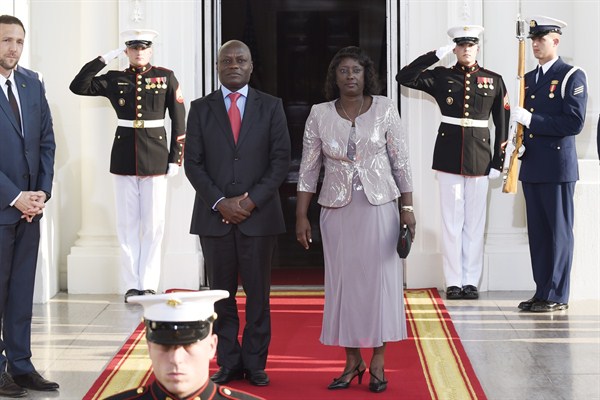Last week, in a bid to end a months-long political crisis, Guinea-Bissau’s president, Jose Mario Vaz, swore in a new government after initial talks collapsed with Prime Minister Carlos Correia over the formation of a Cabinet. Correia is the third prime minister to hold the post since August, as intraparty rivalries have left Guinea-Bissau without a functioning government for months, risking international aid to a country trying to recover from its latest military coup in 2012. But Guinea-Bissau is not in the clear yet, as the underlying institutional differences at the root of this standoff clearly haven’t been solved yet.
The crisis goes back to August when, in the face of growing discontent with Vaz’s leadership within the ruling PAIGC party that had accumulated since it won elections in 2014, Vaz dismissed Prime Minister Domingos Simoes Pereira, a powerful rival within the party. The move came just days after the PAIGC had threatened to withdraw its support for Vaz. A week later, Vaz appointed Baciro Dja by decree as the new prime minister, a move the Supreme Court quickly ruled was unconstitutional. Dja resigned, and the PAIGC, which still backed Pereira, appointed one of the party’s vice presidents, 82-year-old Correia, as the new prime minister. But after Vaz swore Correia in, the institutional relationship between the new prime minister and the president quickly deteriorated over talks to form a new government, as Vaz initially rejected the Cabinet proposed by Correia because it included nearly all of the same members of Pereira’s government. The new government, nominated on Oct. 13 a day after Vaz named it by decree, is unlikely to be declared unconstitutional as it has the support of the ruling faction of the PAIGC.
Pereira was elected prime minister after the April 2014 elections, which came in the aftermath of a military coup that canceled the 2012 vote. At the time, the international community was pleased with the elections, considered transparent by observers. Consequently, major international donors, such as the European Union, the United Nations and the World Bank, decided to support development and state-building activities as some institutional normalcy returned to the coup-plagued country. In the last four decades, Guinea-Bissau’s army has attempted 12 coups; three have succeeded, including 2012.

